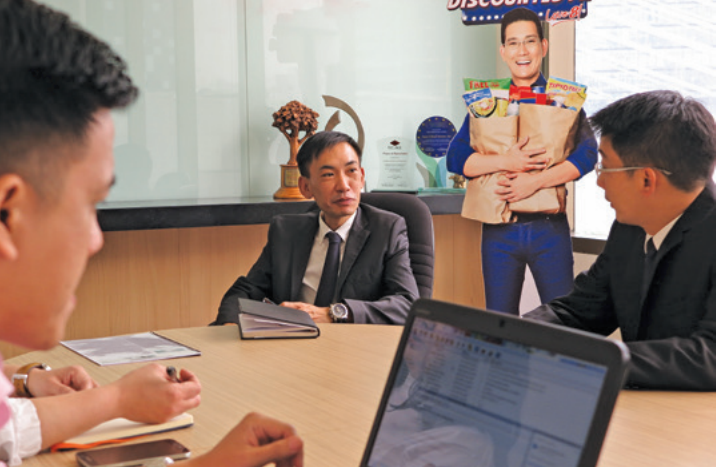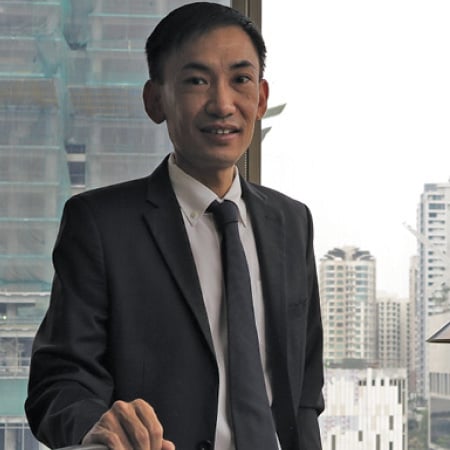One might assume that a chain of wholesale grocery stores’ competitive focus would be price point. However, in the case of Super 8 Retail Systems, it’s not. In a brash turnaround, CEO Alvin Lim has made the core focus of the business its customer service— and it’s working. Sister company to the Philippines’ leading wholesale distribution company, Suy Sing Commercial Corporation, Super 8 was founded in 2006 when retailer Uniwide provided an opportunity.
“We didn’t buy out Uniwide,” Alvin explains, “but at that time Uniwide was under stress and under receivership, so the owner had no choice but to lease out. He didn’t resell, but instead leased out his supermarket business because he didn’t want to run it any more with all the issues he had to contend with. So we took over. We rented from him, and that’s how we got started, with seven stores. We’ve been fortunate to see rapid growth since, and today have 50 stores.”
Roughly half of Super 8’s customers are resellers, although unlike Suy Sing whose customers are the larger independent retailers, Super 8 resellers tend to be smaller independent variety stores—the Sari Sari stores that are dotted all over the Philippines. The other half are shoppers who are looking for a bargain. Because of this, Super 8 has shunned the larger shopping malls, preferring instead to be better accessible to its target market.

“The traffic is so bad in the Philippines,” Alvin says, “it’s horrendous. One of my main concerns for our customers is accessibility and convenience, so we opened smaller stores close to them. They are not inside malls, as that is not where our customers are. Our customers are near community centres and bus terminals, so it makes sense for us to be there too.”
Although it has now grown to 50 stores, Alvin is still planning more growth. In five years, he plans to have 200 stores nationally. Right from the beginning, Alvin had his sights set on expansion and put systems in place to facilitate this. Even though the business started with seven stores, its warehouse facility was set up to cater for a much larger business.
“We had a 10,000-squaremetre facility although we only had seven stores, as we looked ahead and thought about what we would need in the future. We believe that when we start something, we have to build for tomorrow and not just for today,” Alvin says. “When we started, the warehouse was good enough to serve at least 30 stores—more than four times the capacity that we needed— so that shows just how much we invest and plan ahead, to make sure that our stores close down and that opening new stores would be easy.”
One of my concerns for our customers was accessibility and convenience, so we opened smaller stores close to them.
The plan now is to reach 60 stores as the company celebrates its tenth anniversary. Alvin says that it’s all on track, and that the systems put in place will ensure that it all happens smoothly. “With Super 8, we believe in creating a structure—what we call the 3S,” he says.
“What structure basically means is that we have a development plan, and we also have an organisation expansion plan. What we do is plot out how much we need from different aspects of the business from the top all the way down to the bottom. We constantly review the organisation as a whole in terms of how we structure it, and we worked with external parties, such as Watson Wyatt and some other names in the industry, to make sure we came up with a curriculum to develop not only the executives and management team, but the people in the stores themselves.”
Alvin looks at this as a way of planting seeds for growth. “It’s not just Super 8,” he says, “it’s for the board and the family that owns all of these companies, including Suy Sing and Super 8. So yes, we are planting seeds. For us, that means new stores and strategy, but on a bigger scale. We are also getting into new retail formats and new stores—for instance we recently launched Circle K in the Philippines, which is the second biggest franchise store in America. We now have six of those stores and will look to expand that franchise in the future.
“We have also opened new distribution centres to enable us to move into new regions. We are not national right now—we are just on one island— but in the next two years we intend to go national. Since industry in the Philippines is relatively young, we use that to our advantage and always try to plant seeds of growth, so that when harvest time comes we will be ready— we’ll be big enough to take our share and have enough options in order to take advantage of them.”
Although growth is important to the business, Alvin understands that it’s equally important to focus on agility. He wants to open new stores but he also wants to invest in improving customer service and offering new payment options. “I guess that’s the advantage of still being relatively small,” he says.
“We do not look at our size, but we want to look at how nimble we can be. That’s what we try to do—be nimble regardless of the size me might soon become. We try to be as dynamic as possible by always listening to our customers, our members, and each other. Right now, we are focusing on looking within rather than looking outside for an excuse in order to justify what we are doing. We are looking at ourselves, and how we can improve the business even more. Because really, that’s all that we can control—if you start to worry too much about your competition, you will either get daunted or you will get confused.”

We are looking at ourselves, and how we can improve the business even more. Because really, that’s all that we can control.
Even though the initial structure around which the business was built has stood the test of time, Alvin admits that a couple of things have had to change. Mostly, these have been around the way Super 8 does business with its suppliers.
“Unlike how we started out, when it was all about negotiation and power play and it was quite static, as we move forward it’s now more dynamic. It’s not negotiation any more; it’s about collaboration, transparency, and openness. I don’t think we can go back to muscle play— it’s no longer a case of what I have and how big I am.”
“That’s simply not sustainable. Now we really try to work with our suppliers to better serve our customers by looking at the supply chain. Basically, we collaborate; we are on the same side and we try to build bridges every day—we don’t burn any—and those are the principles that we live by.”
“The way we work with suppliers such as Liwayway, NutriAsia, and Peerless are a model of the ideal relationships that we want to have, which are all really collaborative. These companies have enjoyed tremendous growth with us and that’s because of the closeness of the way we are working with them— the collaboration of ideas, as well as the transparency—plus they espouse the same values that we do. We actually choose suppliers in the same way that we choose our people, and it’s based on the 3C’s: character, culture, and competence.
“Character means the integrity to deliver on their commitments and that they are as passionate as we are,” Alvin explains. “We also want to have a shared culture, meaning that they listen and try to adapt to how we are. We are not corporate; we are not family ; we are progressive but we are independent, so it’s really a fine balance. We want suppliers who will fit in with this culture, so that we can work closely and collaborate.
“Competence means that we want to work with people and organisations who believe in the same standards that we do. One of our guiding principles is service excellence, and we expect the same from our vendors. These three things are at the forefront of all business dealings with our suppliers and the key areas for selecting who we partner with, both internally and externally.
“Super 8 always tries to find new ways to do things, rather than just looking at what’s there. Things that give us a competitive edge now are not just volume, but a mindset and a way of doing things—it’s not just based on size and muscle.”


And if you offer franchising of your Super 8 Grocery. Can you give me the Franchise Cost and its inclusions. How much Cash Investment we will be needing? Thank you. From Edna A. Rana